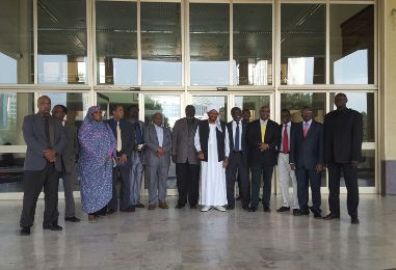Sudan accuses Uganda of orchestrating AUPSC – rebel meeting
September 7, 2015 (KHARTOUM) – A Sudanese presidential assistant has accused Uganda of orchestrating a meeting in Addis Ababa last month between the African Union Peace and Security Council (AUPSC) and the Sudanese rebel groups.

He said the Sudanese government had officially demanded an explanation.
In an interview with the Turkish news agency Anadolu published Monday, Hamid said that the AUPSC’s meeting with the rebel and opposition groups would have “negative repercussions as manifested by dealing with rebel and hardline groups that are playing havoc with peace in many countries.”
Sudanese opposition leaders held a meeting with AUPSC on August 24, on the eve of a session during which the 15-member body heard a report by Thabo Mbeki on his efforts to facilitate the dialogue process in Sudan.
At the conclusion of that session, the Council called for a national dialogue preparatory meeting on the issues related to the process and procedures between the government and the opposition groups in Addis Ababa.
Among those who attended that meeting were al-Sadig al-Mahdi, Head of the National Umma Party, and Malik Agar, Chairman of Sudanese Revolutionary Front (SRF), a coalition of rebel groups, including three movements from western Sudan region of Darfur and the SPLM-North which is fighting the government troops in Blue Nile and South Kordofan states.
Last March Khartoum turned down an invitation by the African Union High Level Implementation Panel (AUHIP) for a pre-dialogue meeting with its rivals. That stance was read by the opposition as “backing off” from an African roadmap that the NCP had endorsed in September 2014.
Hamid denied any disagreements between his government and the AUPSC, which had mandated the AUHIP led by former South African President Thabo Mbeki to mediate between the Sudanese parties.
While describing Khartoum’s relations with the AUPSC member states as ‘generally good’, the Sudanese official pointed an accusing fingers at Uganda, which had strained relations with his government.
He interpreted the PSC delegate’s absence from the hearing of the opposition groups as an indication that the meeting ‘was not official”. However, he called for “denouncing this precedent which can open the doors for armed rebels and terrorist organizations to have access to the African Union premises”.
The African Union is trying to rescue a faltering dialogue launched by President al-Bashir early last year, but was boycotted by the major political and armed opposition groups, in protest against al-Bashir’s rejection of their preconditions.
In August 2014 the AU extended the mandate of the AUHIP and tasked it with the facilitation of the dialogue process, in addition to his mediation between Khartoum and Juba, and between Khartoum and the SPLM-N rebels.
The opposition groups say they are not opposed to holding the dialogue inside the Sudan. However, they are insisting that a pre-dialogue meeting be held abroad, under an African patronage, to create conducive environment for the dialogue.
On its part, Khartoum is still insisting that any discussions related to the political process should be held inside the Sudan and offered to guarantee the safety of the rebel leaders in case they accept to attend.
At its meeting on August 25, the AUPSC allowed mediator Mbeki 90 days to file a report on ‘the engagement of all Sudanese stakeholders in the efforts to hold serious, all-encompassing national dialogue as contemplated in the road map’.
(ST)

